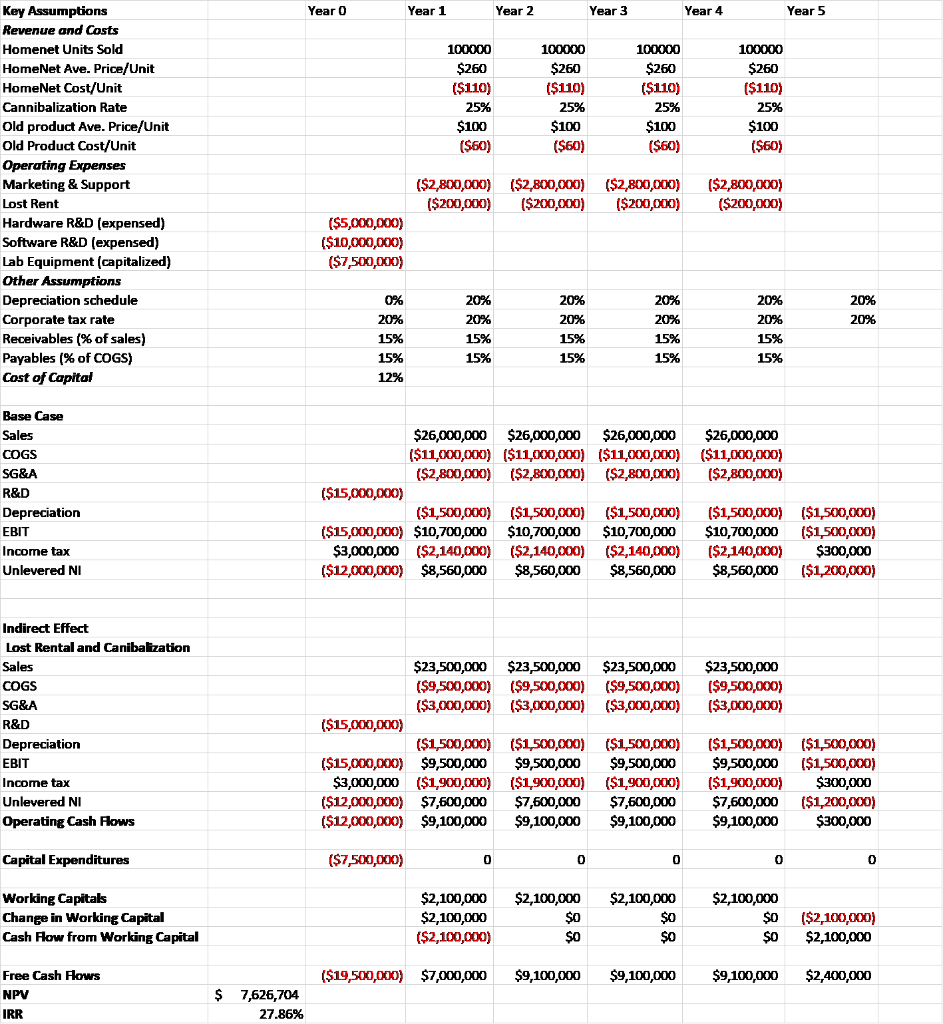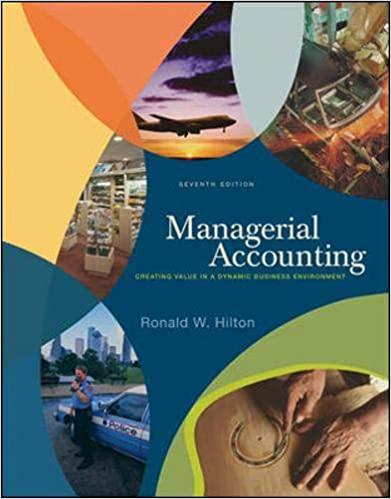Question
After looking at the projections of the HomeNet project, you decide that they are not realistic. It is unlikely that sales will be constant over
 After looking at the projections of the HomeNet project, you decide that they are not realistic. It is unlikely that sales will be constant over the four-year life of the project. Furthermore, other companies are likely to offer competing products, so the assumption that the sales price will remain constant is also likely to be optimistic. Finally, as production ramps up, you anticipate lower per unit production costs resulting from economies of scale. Therefore, you decide to redo the projections under the following assumptions:
After looking at the projections of the HomeNet project, you decide that they are not realistic. It is unlikely that sales will be constant over the four-year life of the project. Furthermore, other companies are likely to offer competing products, so the assumption that the sales price will remain constant is also likely to be optimistic. Finally, as production ramps up, you anticipate lower per unit production costs resulting from economies of scale. Therefore, you decide to redo the projections under the following assumptions:
- Sales of 50,000 units in year 1 increasing by 50,000 units per year over the life of the project, a year 1 sales price of $260/unit, decreasing by 10% annually and a year 1 cost of $120/unit decreasing by 20% annually.
- In addition, new tax laws allow 100% bonus depreciation (all the depreciation expense occurs when the asset is put into use, in this case in Year 0).
- Each year 20% of sales comes from customers who would have purchased an existing Cisco router for $100/unit and that this router costs $60/unit to manufacture. The existing router's price will decrease by 10% annually and its cost will decrease by 20% annually as well.
- The used equipment that Cisco purchased for $7.5 in Year 0 is sold in Year 5 for a salvage value of $0.5 million.
- Other assumptions remain the same, including lost rental and 4% inflation in SG&A expenses.
a. Keeping the other assumptions that underlie Table 8.3 the same, recalculate unlevered net income (that is, reproduce Table 8.3 under the new assumptions. Please note that cannibalization and lost rent must be included. (1 point)
b. Calculate HomeNets net working capital requirements under the new assumptions. (1 point)
c. Calculate HomeNets FCF under the new assumptions. (1 point)
d. Should the project be taken or rejected based on NPV rule under the assumptions? Please show me your calculation. Simply answering yes or no will earn 0 credit. (1 point)
e. Should the project be still taken if the unit sales is 20% lower than originally expected under the new assumptions? Please show me your calculation. Simply answering yes or no will earn 0 credit. (1 point)
Year o Year o Year 1 Year 2 Year 3 Year 4 Year 5 100000 $260 ($110) 25% $100 ($60) 100000 $260 ($110) 25% $100 ($60) 100000 $260 ($110) 25% $100 ($60) 100000 $260 ($110) 25% $100 ($60) Key Assumptions Revenue and Costs Homenet Units Sold HomeNet Ave. Price/Unit HomeNet Cost/Unit Cannibalization Rate Old product Ave. Price/Unit Old Product Cost/Unit Operating Expenses Marketing & Support Lost Rent Hardware R&D (expensed) Software R&D (expensed) Lab Equipment (capitalized) Other Assumptions Depreciation schedule Corporate tax rate Receivables (% of sales) Payables (% of COGS) Cost of Capital ($2,800,000) ($200,000) ($2,800,000) ($200,000) ($2,800,000) ($200,000) ($2,800,000) ($200,000) ($5,000,000) ($10,000,000) ($7,500,000) 20% 20% 0% 20% 15% 15% 12% 20% 20% 15% 15% 20% 20% 15% 15% 20% 20% 15% 15% 20% 20% 15% 15% Base Case Sales COGS SG&A R&D Depreciation EBIT Income tax Unlevered NI $26,000,000 $26,000,000 $26,000,000 $26,000,000 ($11,000,000) ($11,000,000) ($11,000,000) ($11,000,000) ($2,800,000) ($2,800,000) ($2,800,000) ($2,800,000) ($15,000,000) ($1,500,000) ($1,500,000) ($1,500,000) ($1,500,000) ($1,500,000) ($15,000,000) $10,700,000 $10,700,000 $10,700,000 $10,700,000 ($1,500,000) $3,000,000 ($2,140,000) ($2,140,000) ($2,140,000) ($2,140,000) $300,000 ($12,000,000) $8,560,000 $8,560,000 $8,560,000 $8,560,000 ($1,200,000) $23,500,000 ($9,500,000) ($3,000,000) $23,500,000 ($9,500,000) ($3,000,000) Indirect Effect Lost Rental and Canibalization Sales COGS SG&A R&D Depreciation EBIT Income tax Unlevered NI Operating Cash Flows $23,500,000 $23,500,000 ($9,500,000) ($9,500,000) ($3,000,000) ($3,000,000) ($15,000,000) ($1,500,000) ($1,500,000) ($15,000,000) $9,500,000 $9,500,000 $3,000,000 ($1,900,000) ($1,900,000) ($12,000,000) $7,600,000 $7,600,000 ($12,000,000) $9,100,000 $9,100,000 ($1,500,000) $9,500,000 ($1,900,000) $7,600,000 $9,100,000 ($1,500,000) ($1,500,000) $9,500,000 ($1,500,000) ($1,900,000) $300,000 $7,600,000 ($1,200,000) $9,100,000 $300,000 Capital Expenditures ($7,500,000) 0 0 0 0 O Working Capitals Change in Working Capital Cash Flow from Working Capital $2,100,000 $2,100,000 ($2,100,000) $2,100,000 $0 $0 $2,100,000 $0 $0 $2,100,000 $0 $0 ($2,100,000) $2,100,000 ($19,500,000) $7,000,000 $9,100,000 $9,100,000 $9,100,000 $2,400,000 Free Cash Flows NPV IRR $ 7,626,704 27.86% Year o Year o Year 1 Year 2 Year 3 Year 4 Year 5 100000 $260 ($110) 25% $100 ($60) 100000 $260 ($110) 25% $100 ($60) 100000 $260 ($110) 25% $100 ($60) 100000 $260 ($110) 25% $100 ($60) Key Assumptions Revenue and Costs Homenet Units Sold HomeNet Ave. Price/Unit HomeNet Cost/Unit Cannibalization Rate Old product Ave. Price/Unit Old Product Cost/Unit Operating Expenses Marketing & Support Lost Rent Hardware R&D (expensed) Software R&D (expensed) Lab Equipment (capitalized) Other Assumptions Depreciation schedule Corporate tax rate Receivables (% of sales) Payables (% of COGS) Cost of Capital ($2,800,000) ($200,000) ($2,800,000) ($200,000) ($2,800,000) ($200,000) ($2,800,000) ($200,000) ($5,000,000) ($10,000,000) ($7,500,000) 20% 20% 0% 20% 15% 15% 12% 20% 20% 15% 15% 20% 20% 15% 15% 20% 20% 15% 15% 20% 20% 15% 15% Base Case Sales COGS SG&A R&D Depreciation EBIT Income tax Unlevered NI $26,000,000 $26,000,000 $26,000,000 $26,000,000 ($11,000,000) ($11,000,000) ($11,000,000) ($11,000,000) ($2,800,000) ($2,800,000) ($2,800,000) ($2,800,000) ($15,000,000) ($1,500,000) ($1,500,000) ($1,500,000) ($1,500,000) ($1,500,000) ($15,000,000) $10,700,000 $10,700,000 $10,700,000 $10,700,000 ($1,500,000) $3,000,000 ($2,140,000) ($2,140,000) ($2,140,000) ($2,140,000) $300,000 ($12,000,000) $8,560,000 $8,560,000 $8,560,000 $8,560,000 ($1,200,000) $23,500,000 ($9,500,000) ($3,000,000) $23,500,000 ($9,500,000) ($3,000,000) Indirect Effect Lost Rental and Canibalization Sales COGS SG&A R&D Depreciation EBIT Income tax Unlevered NI Operating Cash Flows $23,500,000 $23,500,000 ($9,500,000) ($9,500,000) ($3,000,000) ($3,000,000) ($15,000,000) ($1,500,000) ($1,500,000) ($15,000,000) $9,500,000 $9,500,000 $3,000,000 ($1,900,000) ($1,900,000) ($12,000,000) $7,600,000 $7,600,000 ($12,000,000) $9,100,000 $9,100,000 ($1,500,000) $9,500,000 ($1,900,000) $7,600,000 $9,100,000 ($1,500,000) ($1,500,000) $9,500,000 ($1,500,000) ($1,900,000) $300,000 $7,600,000 ($1,200,000) $9,100,000 $300,000 Capital Expenditures ($7,500,000) 0 0 0 0 O Working Capitals Change in Working Capital Cash Flow from Working Capital $2,100,000 $2,100,000 ($2,100,000) $2,100,000 $0 $0 $2,100,000 $0 $0 $2,100,000 $0 $0 ($2,100,000) $2,100,000 ($19,500,000) $7,000,000 $9,100,000 $9,100,000 $9,100,000 $2,400,000 Free Cash Flows NPV IRR $ 7,626,704 27.86%Step by Step Solution
There are 3 Steps involved in it
Step: 1

Get Instant Access to Expert-Tailored Solutions
See step-by-step solutions with expert insights and AI powered tools for academic success
Step: 2

Step: 3

Ace Your Homework with AI
Get the answers you need in no time with our AI-driven, step-by-step assistance
Get Started


